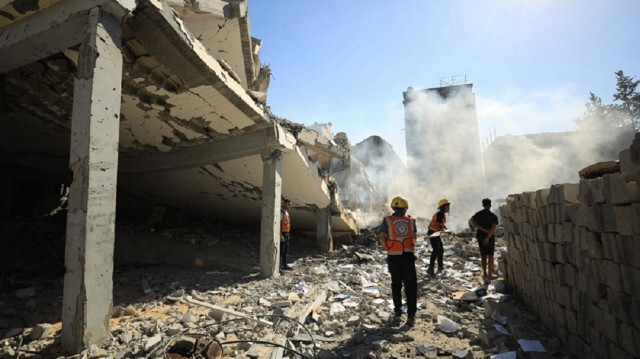Intensified Conflict Across Gaza: Impact and Responses
The escalating conflict between Israel and Gaza results in mounting casualties, with multiple international efforts to mediate a truce facing significant challenges.
Published July 20, 2024 - 00:07am

Image recovered from deccanherald.com
The Gaza Strip is engulfed in one of its most severe periods of violence as Israeli forces intensify their military operations against Hamas. In recent days, various strategic locations across Gaza have come under heavy bombardment. The historic refugee camps in central Gaza and Gaza City in the north were targeted on Thursday, resulting in the deaths of at least 21 people. Furthermore, tank advancements in southern Gaza's Rafah region have brought additional pressure on the already beleaguered inhabitants.
The human cost of the ongoing conflict is staggering. The Gaza Health Ministry reports that since October 7, a devastating total of 38,848 Palestinians have lost their lives due to Israeli offensives, with many more injured. The sudden onslaught claimed 16 lives in the towns of Zawayda, Bureij, and Nuseirat, as well as in Deir Al-Balah, a major urban center yet to be invaded by Israeli forces.
Prime Minister Benjamin Netanyahu's recent visit to southern Gaza underscores the intensity of the military campaign. Netanyahu met with Israeli forces stationed near Rafah, emphasizing the dual objectives of exerting military pressure and negotiating the release of 120 hostages held by Hamas. His visit precedes a crucial trip to Washington, where he aims to demonstrate his resolve to international allies.
The magnitude of destruction in Gaza is reflected in the plight of its displaced residents. Scenes of Palestinians lining up for food in Beit Lahia highlight the dire humanitarian situation. The International Committee of the Red Cross (ICRC) expressed concerns over the Red Cross field hospital in Rafah nearing its capacity limits due to the influx of casualties.
Daily life in Gaza remains fraught with peril, with multiple Israeli strikes resulting in civilian casualties. On Thursday, airstrikes in Bureij claimed additional lives, including members of a family trapped beneath the rubble of a destroyed house. As residents of Khan Younis witnessed, even hospitals are not sanctuaries, with bodies being exhumed and relocated to manage the overflowing capacity of medical facilities.
Diplomatic efforts to halt hostilities have struggled to gain traction. Efforts by Qatar and Egypt, with US backing, to mediate a ceasefire have yet to yield results. However, the United States continues to push diplomatically, with US Middle East envoy Brett McGurk traveling to the region for consultations. Tangibly, these discussions aim to finalize a truce between Israel and Hamas, a daunting task in the current climate of distrust and animosity.
Adding to the complexity, Netanyahu's government blocked an initiative by Defence Minister Yoav Gallant to establish a field hospital in Israel for Gaza's sick children. This decision drew international attention, underscoring the contentious politics associated with humanitarian aid in the conflict.
The recent extension of a controversial law by Israel's parliament, granting the government authority to shut down foreign media outlets deemed a security threat, has further inflamed tensions. This law has already been used to close Qatar-based Al Jazeera in Israel, affecting the global media landscape's coverage of the conflict.
Amid the ongoing violence, there's a sliver of hope regarding the Rafah border crossing. Israeli officials are contemplating a transfer of control to the European Union and Palestinians. This crossing, which has been a focal point of contention, could pave the way for more humanitarian aid to enter Gaza, alleviating the suffering of its residents. Prime Minister Netanyahu remains cautious, particularly about ceding control that could potentially benefit Hamas.
Internationally, this conflict continues to draw stark reactions. The United Nations and the United States advocate for reopening the Rafah crossing to ensure essential supplies reach Gaza. White House spokesperson John Kirby emphasized the need for a sustainable solution to the crossing's operation, reflecting the broader international community's stance.
Economic indicators reveal a glimmer of optimism. The prospect of a ceasefire has revitalized investor interest in Israeli markets, with the shekel and local bonds experiencing considerable recoveries. This financial resurgence hinges on the delicate balance of diplomatic negotiations holding firm against the backdrop of nearly a decade-long conflict.
As Netanyahu prepares for his trip to Washington, the broader implications of the Israeli-Gaza conflict will undoubtedly come under scrutiny. Central to these discussions will be the establishment of a Palestinian state, a solution supported by many international actors, including the United Nations, despite recent opposition from the Israeli Knesset.
The evolving situation in Gaza remains a deeply complex and volatile affair. The multidimensional crisis involving military, humanitarian, and diplomatic components requires concerted efforts from all stakeholders to forge pathways toward lasting peace and stability in the region.






